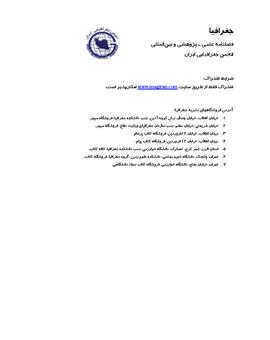The study of contemporary Kurdish history in Iran from the perspective of social textbooks, history and geography of high school of the Kurdistan region of Iraq
Subject Areas :1 , Mohammad 2 , 3
1 -
2 -
3 -
Keywords: Identity, Formal education, Kurds, Kurdistan Region of Iraq, Iran,
Abstract :
The development of a national and ethnic identity in the periphery of Iran has become widespread in recent decades. The process of geopolitical developments and the formation of new political units around Iran has strengthened this in relation to shaping identity or friction. Among these areas is the Kurdistan Region of Iraq, which after being successful in autonomy, the regional culture began to formulate a formal reading of history to create an identity support for the people of this region. In historical studies, the relativity of this region with the history of Iran can be consider as three periods: in ancient times, the Islamic period and contemporary, these courses can be divided and differentiated. The two previous periods have been review in separate articles. The study of the official history of Kurdistan Region in contemporary history, especially in relation to the common political and historical events between Iran and the Kurdistan Region, is explore. This research based on descriptive-analytical method and with the data was gathering tool through library studies. The textbooks of social studies, history and geography of the high school of the Kurdistan Region of Iraq, have been investigated and analyzed. The results indicate that the official education system approach in the Kurdistan region to the category of Iranian history and identity is not the same as the ancient era and in most cases, there is a kind of heterogeneity in the readings of the Kurds in Iran with what is in the Kurdistan Region textbooks.
1. اسميت، آنتوني دي(1383)، ناسيوناليسم. ترجمة منصور انصاري. تهران: مؤسسة مطالعات ملي؛
2. حسین¬عثمان، سعدی و همکاران، مطالعات اجتماعی (بخش تاریخ) برای کلاس نهم (2014)، حکومت اقلیم کردستان، زیر نظر وزارت آموزش و پرورش (وزارت برنامه¬ریزی و انتشارات)؛
3. شوان¬عثمان و همکاران، مطالعات اجتماعی (بخش تاریخ) برای کلاس هفتم (2014) حکومت اقلیم کردستان عراق، زیر نظر وزارت آموزش و پرورش به کوشش مدیرکل برنامه¬ریزی و انتشارات به زبان کُردی سورانی؛
4. صبری فارس الهیتی و همکاران، جغرافیای عمومی برای کلاس دهم (2014 م)، حکومت اقلیم کردستان عراق، وزارت آموزش و پرورش (وزارت برنامه¬ریزی و انتشارات)؛
5. عبدالعزیز حمد حکمت و همکاران، مطالعات اجتماعی (بخش جغرافیا) برای کلاس نهم ( 2014)، حکومت اقلیم کردستان، زیر نظر وزارت آموزش و پرورش (وزارت برنامه¬ریزی و انتشارات)؛
6. عبدالله اسماعیل سلیمان و همکاران، مطالعات اجتماعی (بخش جغرا فیا) برای کلاس هشتم ( 2014 م) حکومت اقلیم کردستان عراق زیر نظر وزارت آموزش و پرورش(وزارت برنامه¬ریزی و انتشارات)؛
7. عبدی، عطاالله؛ لطفی، مریم؛ جایگاه هویت ملی در کتب درسی آموزش و پرورش، مورد مطالعه (کتب تاریخ دوره دبیرستان فصلنامه مطالعات ملی، سال نهم، شماره 3 (1387)، انتشارات مطالعات ملی؛
8. عثمان¬روستایی، صادق؛ احمد و همکاران، تاریخ معاصر برای کلاس یازدهم، (2014 م) حکومت اقلیم کردستان زیر نظر وزارت آموزش و پرورش (وزارت برنامه¬ریزی و انتشارات)؛
9. علی¬احمد، احمد و همکاران، مطالعات اجتماعی(بخش جغرافیا) برای کلاس هفتم (2010) حکومت اقلیم کردستان عراق، زیر نظر وزارت آموزش و پرورش به کوشش مدیرکل برنامه¬ریزی و انتشارات به زبان کردی سورانی؛
10. محمد وهبی، نازنین و همکاران، تاریخ معاصر و هم¬عصر برای کلاس دوازدهم، (2014 م) حکومت اقلیم کردستان عراق، وزارت آموزش و پرورش (وزارت برنامه¬ریزی و انتشارات)؛
11. مقصودی مجتبی، بابسته¬های نظام آموزشی ایران در حوزه سیاستگذاری هویتی و همبستگی ملی در کتاب هویت و همبستگی ملی در نظام آموزشی ایران به اهتمام مجتبی مقصودی (1391)، تهران، انتشارات تمدن ایرانی؛
12. مقصودي, مجتبي(1381)، تحولات قومي در ايران. تهران. مطالعات ملي؛
13. هاچينسون، جان و آنتوني اسميت (1386)، ملي¬گرايي. تهران: پژوهشکده مطالعات راهبردي؛
14. Black sell, Mark (2006), Political Geography, London, Rutledge.


